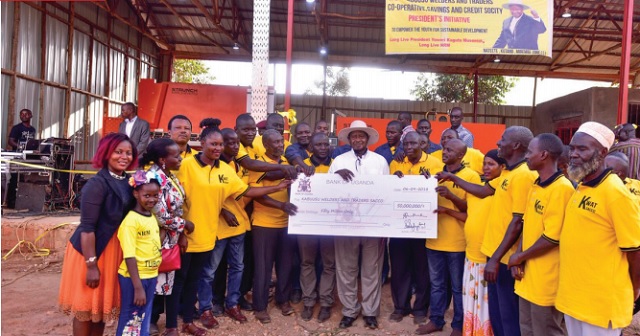
In June this year, President Museveni also warned the ruling party District Chairpersons against “unnecessary use of money” in elective politics.
“I do not support the use of money in politics,” he said.
His latest criticism came out at the beginning of November.
“If you can bring money and you are elected because of money not because of your performance, that means the people have no power to punish you. The vote should be to punish or to reward you for doing well,” said President Museveni on Nov.11 at a meeting with a delegation of members of the Inter-Party Organisation for Dialogue (IPOD), a platform brings together leaders of political parties to discuss issues that affect them, at State House Entebbe.
Many are not convinced. According to legislator Winfred Niwagaba, for instance, because President Museveni has made handing out cash to citizens a culture, people now expect that politicians must dish out public resources.
Like Niwagaba, many critics feel that legislators and other public officials are now expected to give handouts to sick people, schools, religious organisations, women and youth groups, and individual with personal financial requests for school fees, wedding, and funerals.
Dr. Julius Kizza, in his paper titled ‘Money Matters: Financing Illiberal Democracy in Uganda”, says political finance “is the mega-explanation of Museveni’s victory and Besigye’s loss”.
“Elections in Uganda have become procedural rituals, not opportunities for establishing government by consent, thanks to the obscenely high financialisation of the elections,” he writes.
Although vote buying is proscribed by law, the Commonwealth Observer Group of the 2011 election, in their report, say “the use of money in elections has become a culture in Uganda and voters have become accustomed to receiving bribes for their votes.”
However, according to some insiders, the ever-growing bill might explain why President Museveni also appears concerned about election spending.
Although the 2021 elections are two years away, Museveni and his NRM party are already deeply engaged over campaign cash; how to get it and how to spend it.
What is surprising, however, is that this time around they are talking more about regulating election spending. The Independent has learnt that plans by a group of legislators to come up with a law aimed at curbing excessive use of money in elections are gaining more momentum two years ahead of the 2021 elections.
This became apparent on Nov.27, when over 30 legislators met at Hotel Africana in a bid to galvanise support for the effort after several years of working behind the scenes. Majority or 19 of the 30 legislators who attended the event belong to the NRM.
Alex Ruhunda, also a member of the ruling party, is leading the effort under the Campaign Finance Reform Group of MPs. The Independent was unable to speak to Ruhunda as he could not be reached by phone.
However, insiders say they expect him to table a motion in parliament seeking permission to present a Private Members Bill before the end of this month. The plan is to have the law in force by June next year.
The desire to have the law in force within a few months and before campaigns for 2021 elections start partly explains why the group opted to amend the existing law rather than introduce a new law all together, an insider told The Independent.
It also explains why officials are limiting their efforts to parliament. According to insiders, some legislators preferred a blanket law targeting all politicians; especially President Yoweri Museveni, who they see as the biggest money problem.
However, the strategists behind this effort felt that if President Museveni felt targeted, he would use the ruling party, which he controls and which commands a 60-percent majority in parliament, to out fight such a bill.
The current laws do not prohibit the excessive use of money in election campaigns or regulate donations to candidates participating in parliamentary elections.
As such, candidates vying for parliamentary sits, can raise unlimited amounts of cash from any source, legal or otherwise, and spend it on securing election to parliament.
“Unrestricted campaign spending has resulted in the commercialisation of politics which caused unsustainable levels of debt among MPs, macro-economic volatility; growing levels of corruption and an uneven playing field in elections,” reads a brief prepared by the sponsors of the bill.
According to the brief, the proposed private member’s bill seeks to amend the parent Act by introducing; limits on campaign spending; transparency and accountability for campaign finance; the high court as the adjudicator of disputes between candidates and tougher civil sanctions against vote buying.
The proposed Bill covers campaign spending for the period beginning 90 days prior to nominations and through to the declaration of results.
 The Independent Uganda: You get the Truth we Pay the Price
The Independent Uganda: You get the Truth we Pay the Price





